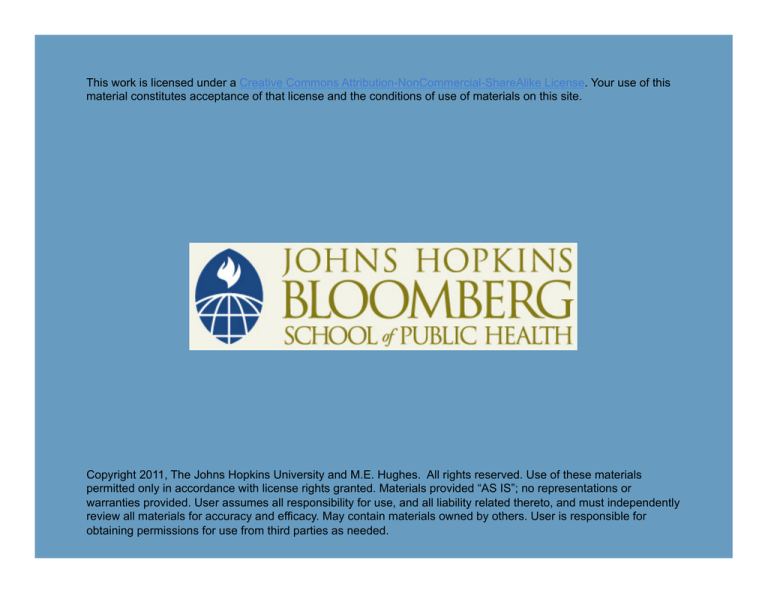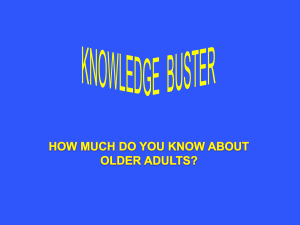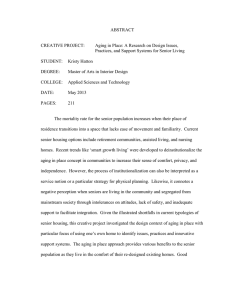
This work is licensed under a Creative Commons Attribution-NonCommercial-ShareAlike License. Your use of this
material constitutes acceptance of that license and the conditions of use of materials on this site.
Copyright 2011, The Johns Hopkins University and M.E. Hughes. All rights reserved. Use of these materials
permitted only in accordance with license rights granted. Materials provided “AS IS”; no representations or
warranties provided. User assumes all responsibility for use, and all liability related thereto, and must independently
review all materials for accuracy and efficacy. May contain materials owned by others. User is responsible for
obtaining permissions for use from third parties as needed.
Health and Functioning in Later Life
M. E. Hughes, PhD, MA
Johns Hopkins University
Section A
Is “Late Life Development” an Oxymoron?
Defining Old Age
What makes a person “old” in your native culture?
4
Defining Old Age
What makes “old” adults different from “non-old” adults?
Potential criteria
- Chronological age
- Social roles (kids grown, grandparent, retired, not actively
working)
- Physical appearance
- Health status
- Ability to function independently
- Cumulative life experience
5
Administrative Definitions
In the U.S. and in other nations, “old age” is defined by age of
eligibility for national pensions (e.g., Social Security in the U.S.)
Demographers define three groups
- Young-old: ages 65–74
- Old-old: ages 75–84
- Oldest old: ages 85+
6
Old Age and Aging Have an Image Problem
Negative public perceptions of older adults (ageism)
- Stereotypes that most older adults are disabled, ill, and have
little to offer society
- Focus on “anti-aging” products and “treatments”
- Prevalence of “age denial”
- Perception that there’s a zero-sum game between the young
and the old
7
Old Age and Aging Have an Image Problem
8
Old Age and Aging Have an Image Problem
9
Negative Image of Aging Research and Clinical Practice
Who cares?
Not “sexy”
The “softest” of science
Not about “cure” or “saving lives”
Why bother?
Denies future if generational zero-sum game
Not innovative or different
- “… geriatrics is no different than internal medicine …”
10
Images of Aged Differ across Cultures
In many non-Western cultures, aged viewed in more positive terms
Not viewed as a burden
May actually have power relative to younger people
May be due deference and respect
11
Aging Research and Practice in Non-Western Societies
To date, much less attention
- Populations relatively young
- Life expectancy still relatively short in some places
- Other pressing problems
We know very little
Is an issue of the future
12
A Developmental Framework
Thinking about later life in a developmental framework
13
Aging and Development
Usually considered separate phenomena
- Development emphasizes positive change: increasing capacity,
complexity
- Aging emphasizes negative change: loss, declining function
14
However …
Aging refers to process of getting older—not limited to end of life
Aging isn’t all about loss, there are gains
Nor is loss universal in degree or timing (just like development)
Life course continuities in all domains
15
Deaths per 1,000 Population by Age Group, U.S. (1950)
16
Psychological
Cognitive decline
Adaptations
Wisdom
17
Social
Family and friends
- Loss of close others
- Carstensen: “socio-emotional selectivity”
- Help to others, involvement
Work
Civic participation
Leisure
18
A Unified Life Course Framework
Are there symmetries between development early in life and aging
later in life such that we can consider them along a continuum? As
reflecting the same processes?
Can we consider older adults as developing in any meaningful way?
Although much lost, some plasticity remains, though much of it is
behavioral or social or technological
Resilience
19
“Successful Aging”
Rowe and Kahn, 1997
Critics argue that the concept of successful aging needlessly
categorizes some elderly as failures
20




